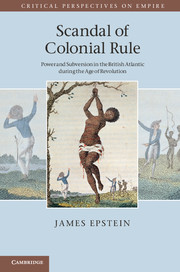Book contents
- Frontmatter
- Contents
- Illustrations and maps
- Acknowledgments
- Cast of characters
- Abbreviations
- Maps
- Introduction
- 1 Politics of colonial sensation
- 2 A gentleman's way in the world
- 3 “Only answerable to God and conscience”: justice unbounded by law
- 4 Ruling narratives
- 5 The radical underworld goes colonial
- 6 In search of free labor
- 7 Conspiracy in the archive
- Epilogue
- Index
- References
Epilogue
Moving on
Published online by Cambridge University Press: 05 June 2012
- Frontmatter
- Contents
- Illustrations and maps
- Acknowledgments
- Cast of characters
- Abbreviations
- Maps
- Introduction
- 1 Politics of colonial sensation
- 2 A gentleman's way in the world
- 3 “Only answerable to God and conscience”: justice unbounded by law
- 4 Ruling narratives
- 5 The radical underworld goes colonial
- 6 In search of free labor
- 7 Conspiracy in the archive
- Epilogue
- Index
- References
Summary
End games
As noted in Chapter 1, the main characters in the metropolitan drama of colonial scandal moved on. Behind the Privy Council's closed doors, leading politicians maneuvered; Picton's prospects improved with the return of Pitt and Dundas to office; Pitt's death in 1806 occasioned delay, but the way had been cleared for Picton's exoneration. At the beginning of 1807, the Privy Council advised the king that the evidence did not support bringing Picton to trial on any of the charges preferred against him. To Fullarton's outrage, Picton regained the Duke of York's favor; in May 1807 Lord Castlereagh, secretary for war and the colonies, presented the former governor to the king at court. With his acceptance of the Privy Council's recommendation, George III commanded Picton to avoid meeting Fullarton “in case he should call upon you for satisfaction.” At Port of Spain, despite many persons being too sick to attend, owing to the uncommon dry season, 130 of Picton's friends celebrated his acquittal at a grand dinner chaired by Governor Hislop. In King's Bench, the matter of torture lingered, with a motion for a new trial; in June 1808, a special verdict of “guilty” was found, a judgment on which the justices never ruled. The same year Picton was promoted to the rank of major-general; in 1809 he took command of a brigade in the ill-fated Walcheren campaign.
With the overthrow of the Bourbon family in Spain, and Napoleon's brother installed as Spain's king, the British government assembled an expedition under Sir Arthur Wellesley's command to liberate South America. In the event, Wellesley's force was sent to restore the independence of Spain. The future Duke of Wellington, short of good field commanders, recruited Picton for the Peninsular campaign on the basis of Miranda's recommendation. Yet the Calderon case followed him. William Grattan, lieutenant in the all-Irish Connaught Rangers, remembered the soldiers' attitude towards Picton on taking command of the third division in summer 1809 on the northeastern frontier of Portugal. He wrote:
It would be impossible to deny that a very strong dislike towards the General was prevalent; his conduct on the island of Trinidad . . . and the torture inflicted by his order on Louise Calderon, a torture which, by the way, had been given up in our army as being worse than flogging, had impressed all ranks with an unfavourable opinion of the man.
- Type
- Chapter
- Information
- Scandal of Colonial RulePower and Subversion in the British Atlantic during the Age of Revolution, pp. 266 - 280Publisher: Cambridge University PressPrint publication year: 2012



